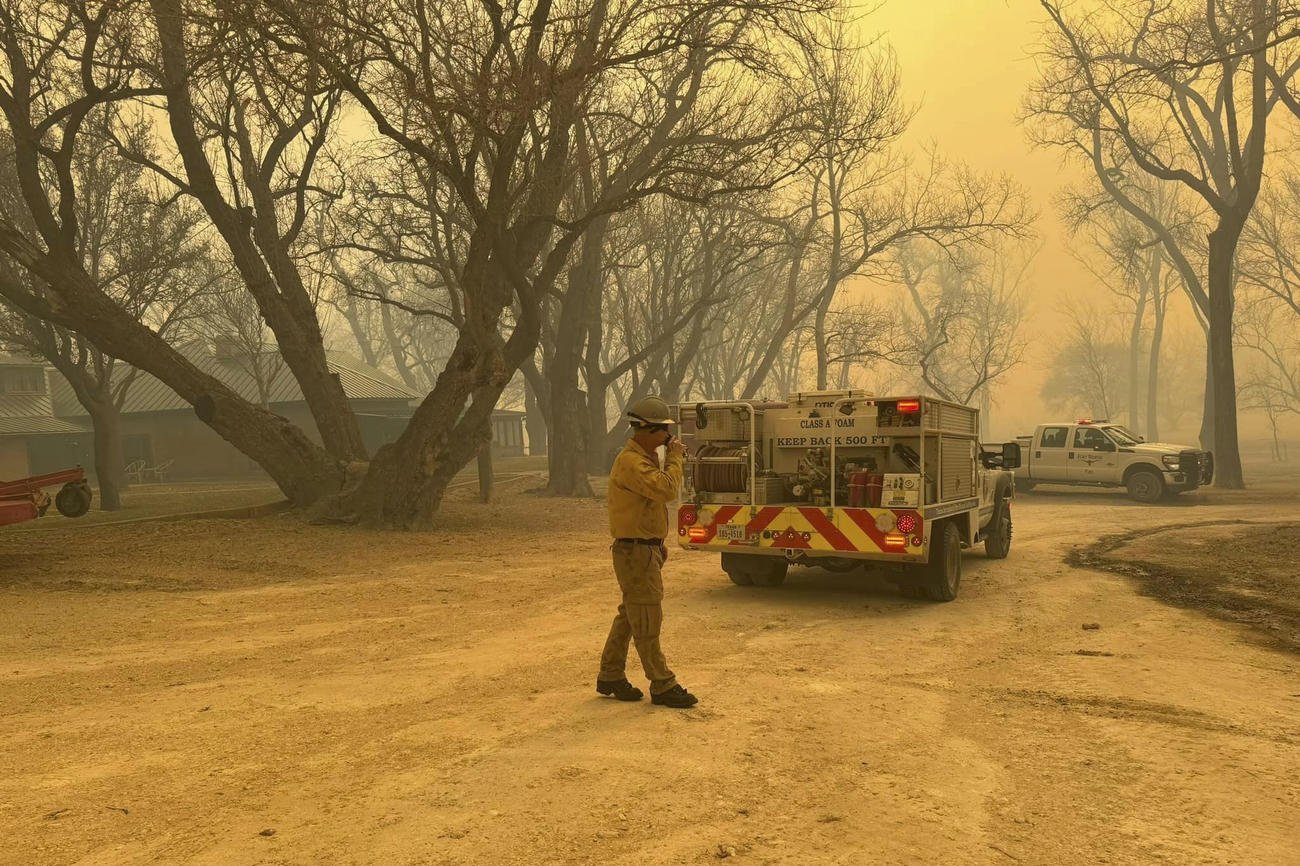
A series of wildfires swept across the Texas Panhandle early Wednesday, prompting evacuations, cutting off power to thousands, and forcing the brief shutdown of a nuclear weapons facility as strong winds, dry grass and unseasonably warm temperatures fed the blazes.
Republican Gov. Greg Abbott issued a disaster declaration for 60 counties as the main blaze, the Smokehouse Creek Fire, swelled into the second-largest wildfire in the state’s history. The main facility that disassembles America’s nuclear arsenal paused operations Tuesday night but said it was open for normal work on Wednesday.
Authorities have not said what might have caused the blaze, which tore through sparsely populated counties set amid vast, high plains punctuated by cattle ranches and oil rigs.
In Borger, a community of about 13,000 in Hutchinson County, Adrianna Hill said she and her family were terrified as fire encircled the entire town until the winds shifted.
“It was like a ring of fire around Borger, there was no way out … all four main roads were closed,” Hill, 28, said. The flames came within about 1 mile (1.6 kilometers) of the home she shares with her husband and 20-month-old son.
“What saved our butts was that northern wind … it blew it the opposite direction,” Hill said. “We were scared, but every night I pray … and that’s all I can do.”
The weather forecast provided some hope for firefighters — cooler temperatures, less wind and possibly rain on Thursday. But for now, the situation was dire in some areas.
The Smokehouse Creek Fire in Hutchinson County burned nearly 800 square miles (2,070 square kilometers), according to an update early Wednesday from the Texas A&M Forest Service. That is five times the size it was on Monday, when it sparked.
As the evacuation orders mounted Tuesday, county and city officials live-streamed on Facebook and tried to answer questions from panicked residents. Officials implored them to turn on their cellphones’ emergency alerts and be ready to evacuate immediately.
An unknown number of homes and other structures in the county were damaged or destroyed, local emergency officials said.
The Pantex plant, northeast of Amarillo, evacuated non-essential staff from the site on Tuesday night out of an “abundance of caution,” Laef Pendergraft, a spokesperson for National Nuclear Security Administration’s Production Office at Pantex, said during a news conference, adding that firefighters remained in case of an emergency.
The plant, long the main U.S. site for both assembling and disassembling atomic bombs, completed its last new bomb in 1991 and has dismantled thousands since.
Pantex tweeted early Wednesday that the facility “is open for normal day shift operations” and that all personnel were to report for duty according to their assigned schedule.
As the fires raged Tuesday, evacuations were ordered in several towns in a swath northeast of Amarillo, and officials across the border in the area of Durham, Oklahoma, also encouraged people to flee.
Texas state Sen. Kevin Sparks said an evacuation order was issued for Canadian, a town of about 2,000 about 100 miles (160 kilometers) from Amarillo. Later Tuesday, the Hemphill County Sheriff’s Office urged anyone who remained in Canadian to shelter in place or at the high school gym because roads were closed.
At least some residents in the small city of Fritch in Hutchinson County were also told to leave their homes Tuesday afternoon because of another fire that had jumped a highway.
“Everything south of Highway 146 in Fritch evacuate now!” city officials said on Facebook.
On Tuesday evening, the fires were 20 to 25 miles (32 to 40 kilometers) from Amarillo, and wind was blowing wildfire smoke into the city, which could affect people with respiratory issues, weather service officials said.
The National Weather Service issued red flag warnings and fire danger alerts for several other states through the midsection of the country, as high winds of over 40 mph (64 kph) combined with warm temperatures, low humidity and dry winter vegetation to make conditions ripe for wildfires.
In central Nebraska, a mower sparked a prairie fire that has burned a huge swath of grassland roughly the size of the state’s largest city of Omaha, state officials said Tuesday.
___
Associated Press reporters Ken Miller in Oklahoma City, Lisa Baumann in Bellingham, Washington, and Stefanie Dazio from Los Angeles contributed.
© Copyright 2024 Associated Press. All rights reserved. This material may not be published, broadcast, rewritten or redistributed.









